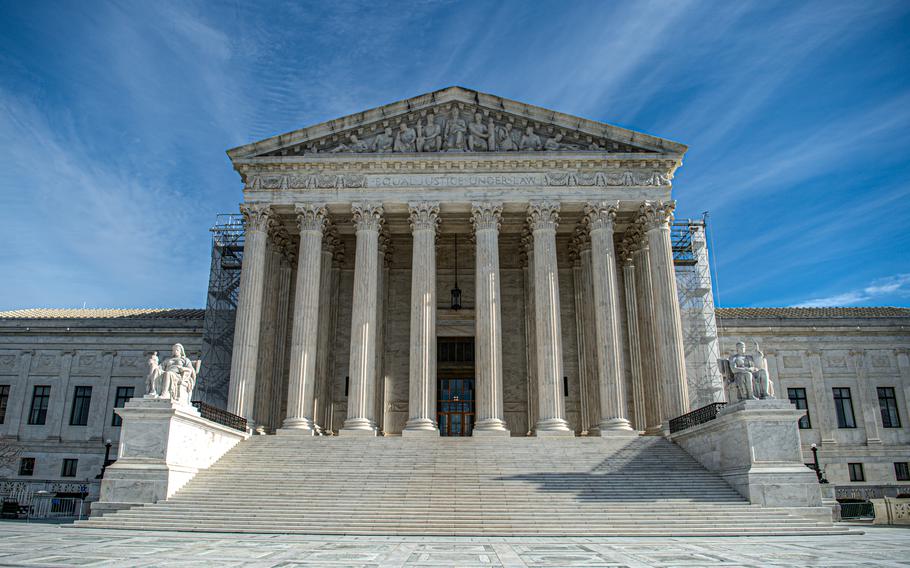
The U.S. Supreme Court on Wednesday, Oct. 16, 2024, heard arguments in a case about how a law is applied to decide Department of Veterans Affairs benefits when there is an equal amount of evidence to approve or deny a veteran’s disability claim. (Stars and Stripes)
WASHINGTON — The U.S. Supreme Court weighed oral arguments Wednesday in a case over how a century-old law is applied to decide Department of Veterans Affairs benefits when there is an equal balance of evidence to support or deny a disability claim.
In Bufkin v. McDonough, the nation’s highest court is examining the existing “benefit-of-the-doubt rule,” which requires the U.S. Court of Appeals for Veterans Claims to favor the veteran when supporting documents including medical records are considered close calls in determining disability compensation.
“There may be no more fundamental precept in the system of veterans benefits than the rule that the veteran, not the government, receives the benefit of the doubt in a close case,” according to the complaint brought by veterans Joshua Bufkin and Norman Thornton against VA Secretary Denis McDonough.
The Supreme Court is being asked to determine whether the Court of Appeals for Veterans Claims must consistently apply the benefit-of-the-doubt rule. A decision is expected next summer.
Bufkin and Thornton filed separate claims that were denied in veterans appeals court, which the U.S. Court of Appeals for the Federal Circuit later upheld.
Bufkin served in the Air Force from 2005 to 2006 and sought benefits for post-traumatic stress disorder, a mental health condition that arises from witnessing traumatic events.
But doctors disagreed whether Bufkin had PTSD, according to court documents. His disability claims for benefits were denied.
Thornton served in the Army from 1988 to 1991 with deployments to the Middle East. He was denied a higher rating for his military service-connected disabilities.
Attorneys for the two veterans said the claims were rejected, despite the presentation of equal evidence that was positive and negative.
Their cases advanced to the U.S. Court of Appeals for the Federal Circuit, which found that the veterans appeals court did not have to enforce the benefit-of-the-doubt rule beyond a review of the evidence for factual errors.
“The federal circuit’s erroneous decision will continue to prevent countless veterans from obtaining the benefits they earned through military service,” the attorneys for Bufkin and Thornton wrote when they appealed the decision to the Supreme Court, according to court documents.
Melanie Bostwick, attorney for the veterans, argued Wednesday that the benefit-of-the-doubt rule is being applied inconsistently by the veterans appeals court.
Bostwick said more than 1,100 former service members appeared in veterans appeals court representing themselves in 2023.
But similar cases often receive contradictory decisions “with some being given benefit of doubt, and some not,” she said.
Justice Amy Coney Barrett asked why the court should consider the benefit-of-doubt rule for Thornton, when he was granted a 100% VA disability rating and has been determined to be unemployable.
“What does he stand to gain?” she asked.
Bostwick said Thornton is subject to periodic review for his disability benefits, which could lower his rating by the VA.
But attorneys for the VA described application of the benefit-of-doubt rule as redundant and amounting to duplicative work for the veterans appeals court.
A friend of the court brief, also known as an amicus brief, filed by the National Law School Veterans Clinic Consortium that favored the veterans stated the federal circuit court decision will “render toothless” the long-held mandate to favor veterans’ claims in cases that seem too close to call.
The benefit-of-the-doubt rule has helped define the review process for deciding veterans compensation since the nation first began providing benefits after the Civil War, according to the brief.
“The claimant-friendly VA benefits scheme is rooted in the government’s long-standing recognition of the service and sacrifices of the nation’s veterans,” according to the brief, which cited President Abraham Lincoln’s second inaugural address that implored the nation to care for its military veterans, their widows and orphans. “By tradition and statute, the benefit of the doubt has and continues to belong to the veteran.”
Also filing amicus briefs in favor of the veterans were the Disabled American Veterans, Military-Veterans Advocacy and the Federal Circuit Bar Association.